► Planning on buying a used electric car in 2025?
► These are the best buys – from city EVs to luxury SUVs
► Save money or get a better car for your budget
If you’re looking for a used electric car, it’s never been a better time to buy. With most new EVs going to fleets and businesses, which swap models every few years for the best electric cars, there’s an ever-growing number of nearly-new EVs landing on dealer forecourts.
Though new electric cars are still widely quite expensive to buy, steep depreciation across the board means used EVs are often fantastic used buys. Data from car valuation experts Cap HPI shows that the average price of a three-year-old EV is now 8.5 per cent lower than an ICE equivalent. Such strong value is making more take the plunge to buy a used EV, with secondhand battery-electric cars sales up 90 per cent in 2023.
The best used electric cars at a glance
On this page you’ll find CAR’s expert take on the best used EVs. From small to large and cheap to expensive, we round up the secondhand EVs to suit you.
Best used electric cars in 2025
Porsche Taycan (2020-)
- Used price from: £40,000
- One of the most entertaining electric cars you can buy
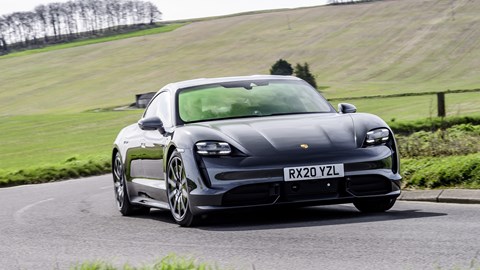
Pros: Great to drive, blistering performance, stunning iterior
Cons: Boggo Taycans are very boggo, question marks around reliability
Porsche doesn’t do things by halves, and that showed with its first electric car – the Tacan – back in 2020. Still more than competitive in terms of range, charging speeds and technology several years later, it proved that you could go electric and still have something great to drive.
While Taycans, especially in covid times, bucked the trend of steep depreciation, even that has now caught up with this Porsche, with used examples now available from around £40,000 – less than half of what a new model would cost you. Look out for models fitted with the larger ‘Performance Plus’ battery, with these offering a longer claimed 288-mile range.
To find out more read our full Porsche Taycan review
Hyundai Kona Electric (2018–)
- Used price from: £11,000
- You’ll struggle to get a longer range for the price
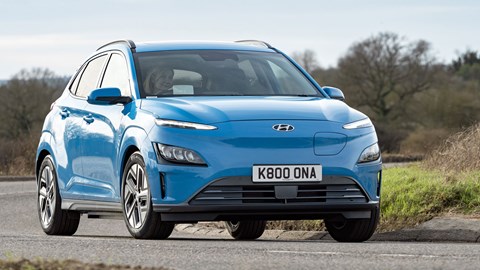
Pros: Good real-world range, generous equipment, most will still have some warranty remaining
Cons: Awkward styling, not very spacious
Hyundai quickly proved its worth when it came to electrification, and the Kona Electric proved to be a bit of a game-changer when it launched in 2018. It was one of the first more affordable EVs to achieve 300 miles from a charge and is renowned for its efficiency. The first-generation Kona Electric wasn’t the most spacious of small crossovers, but should still offer ample space for most.
Hyundai did sell a few versions with a smaller 39kWh battery, but we’d only really consider the larger 64kWh battery for its impressive range. Standard equipment on the Kona Electric is also very generous, and newer examples will still come with Hyundai’s excellent five-year, unlimited-mileage warranty.
To find out more read our Hyundai Kona Electric review
Jaguar I-Pace (2018-)
- Price used from: £16,000
- Premium electric SUV is staggering value for money
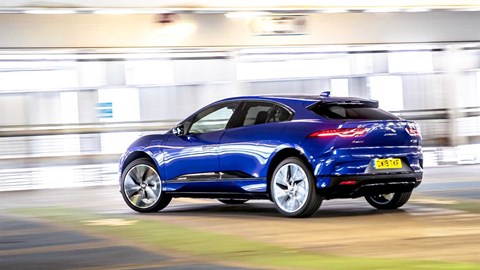
Pros: Avant-garde design has aged well, interior has too, driving dynamics are great
Cons: Bad reliability reputation, uncompetitive charging speeds by modern standards
Dacia Spring or a four-year-old Jaguar I-Pace? The choice is yours. Incredible depreciation means this premium electric SUV is available for a seriously attractive price. It’s still one of the best cars in its class to look and drive, and given Jaguar hasn’t hardly the I-Pace since its introduction in 2018, you won’t feel shortchanged by going used and saving yourself an absolute fortune compared to a new example.
It’s powered by a 90kWh battery pack, which powers two electric motors. You get four-wheel drive, 395bhp, a 0–62mph time of 4.8 seconds and a maximum claimed range of 298 miles. The max charging speed lags well behind more modern rivals, though.
To find out more read our full Jaguar I-Pace review
BMW i3 (2013–2022)
- Price used from: £6,000
- Stylish and fun EV is a guaranteed future classic
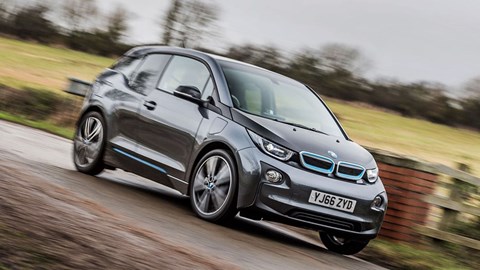
Pros: Compact size, still innovative, great in the city
Cons: Servicing costs, low range on early models
Somewhat surprisingly, one of the best-value used electric cars is the BMW i3. It’s a clever urban runabout with a carbon fibre construction and little shared componentry with other BMWs. It’s a groundbreaking EV that demonstrates the advantages of thinking differently.
While rather costly when it was new, you can now pick up high-mileage examples from just £6,000. The i3 has aged very well in terms of look and feel, but be mindful of small ranges with the earliest cars. Given its rarity, and the fact many of its parts are bespoke, servicing bills and replacement parts are very expensive, however. Other versions worth looking at include the ReX range-extender, as well as the slightly sportier i3S.
To find out more read our full BMW i3 review
MG5 (2020-)
- Price used from: £9,000
- Value-packed EV is the cheapest electric estate you can buy, by some margin
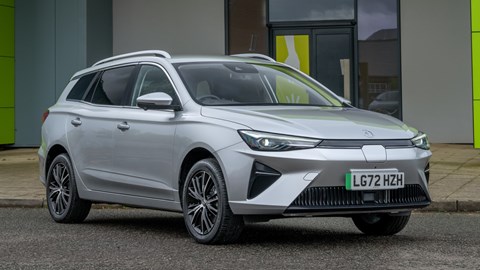
Pros: Very good value, Spacious interior, long warranty
Cons: Minicab vibes, feels a bit cheap inside
MG has earned itself quite a reputation for producing affordable and practical electric cars, and this is especially true on the used market, where steep depreciation and a generous seven-year factory warranty makes them a cracking deal. There’s the choice of the ZS EV crossover, but our vote goes to the MG5, owing it to be one of few electric estate cars available, and certainly the only one at this price.
It feels built to a price, but with three-year-old examples available for just £10,000, it’s a very low price that allows some justification. The MG5 is one of the more compact estate cars, but is still more useful than many crossovers. A welcome facelift in 2022 introduced a more stylish design, as earlier examples look especially plain.
To find out more read our full MG5 EV review.
Vauxhall Corsa Electric (2020-)
- Price used from: £9000
- Hilarious depreciation makes the Corsa Electric a stunning used buy
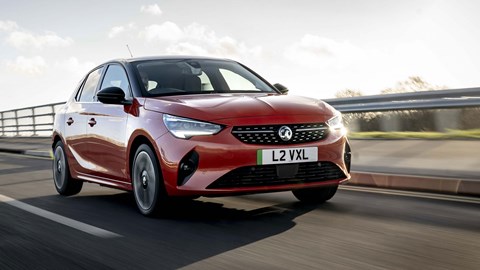
Pros: Big depreciation makes it a cracking used buy, easy to use and drive, plenty of kit
Cons: One of the least exciting EVs ever made, not very efficient
If you want an EV that doesn’t look and feel much different to a regular petrol car, we strongly recommend a look at the Vauxhall Corsa Electric. It’s quite expensive to buy new, but thanks to colossal depreciation, it’s a tremendous used buy. Prices start from £9,000 for a 2020 car – less than what you’d pay for a petrol automatic Corsa of the same age.
Why’s is it so cheap, though? Well, the Corsa isn’t the most desirable of electric cars, and its range/efficiency is quite unremarkable on versions fitted with the more commonplace 50kWh battery. Vauxhall claimed around 220 miles, but 150 is more likely in normal driving. Even still, you get a lot of car for the money with the Corsa Electric.
To find out more read our full Vauxhall Corsa Electric review.
Tesla Model 3 (2019-)
- Price used from: £13,000
- A great range, brilliant technology and increasingly affordable prices makes the Model 3 a great used EV
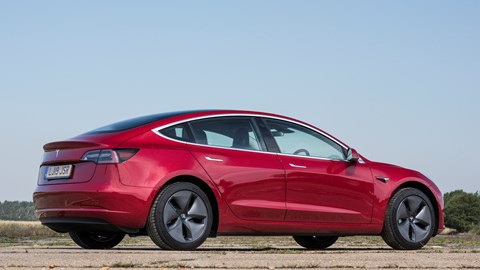
Pros: Great range, strong performance, advanced tech
Cons: Increasing competition, concerns about customer service experiences
The Tesla Model 3 proved a game-changer in the electric car world, and has dominated the market ever since its introduction in 2019, though has more recently been overtaken by the Model Y SUV in the sales standings.
But we’d still choose the Model 3 as it’s better to drive, can go further on a charge and doesn’t look like such a blob either. Tesla’s technology and connectivity continues to be unmatched, as does its seamless charging experience, even if Tesla’s Supercharger network is now open to other cars. Even entry-level models should crack 250 miles on a charge, too, but Long Range models are the ones to go for if maximum range is a priority. Just watch for Tesla’s infamous build quality, as earlier cars were riddled with panel gaps and trim issues that will only have worsened over time.
To find out more read our full Tesla Model 3 review.
Renault Zoe (2013–2024)
- Price used from: £3000
- One of the cheapest ways into a used electric car

Pros: Long range from later cars, decent to drive, incredibly cheap
Cons: Early cars have a rubbish range, some subject to additional monthly battery lease scheme, poor safety rating
If you’re looking to get behind the wheel of an electric car as cheaply as possible, you’ll struggle to beat the Renault Zoe. It was one of the earliest mass-market EVs back in 2013, and used prices now start from as little as £2,500. These will have a short electric range of only around 80 miles, and many are subject to a battery lease scheme whereby you have to pay Renault around £60 per month (depending on mileage), which warrants the battery should the range drop below a certain level.
If your budget will stretch to the heavily facelifted 2020 car, that’s where our money would go, with Renault claiming a 238-mile range. Be mindful that rapid CCS charging was always optional, so have a look in the charge port to see that it is compatible with rapid charging if this is a necessity.
To find out more read our full Renault Zoe review
Fiat 500e (2021–)
- Price used from: £12,000
- Fun, cool and the best electric city car
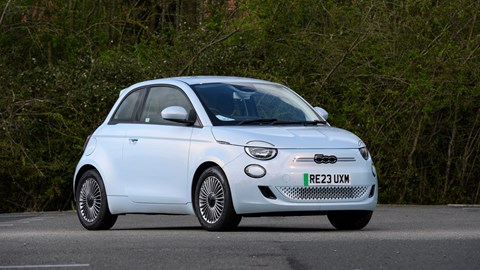
Pros: Ideal in a city, fun to drive, great image
Cons: Not very spacious, rivals have longer ranges
If you’re looking for an electric car to predominantly use around the city, you’ll struggle to find anything better than the Fiat 500e. Combining its well-loved styling and image, it gets a modern electric powertrain that offers zippy performance and range of up to 199 miles (from the larger 42kWh battery).
It’s not the best EV if you do a lot of miles, for around town and for local journeys, it’s an excellent choice. It uses completely different underpinnings to the regular Fiat 500, and is much, much better to drive as a result. The 500e has always been quite an expensive car to buy new, but big depreciation means a three-year-old example can now be had for £12,000.
To find out more read our full Fiat 500e review.
Volkswagen ID.3 (2020-)
- Price used from: £10,000
- Under-appreciated electric VW is good to drive and practical
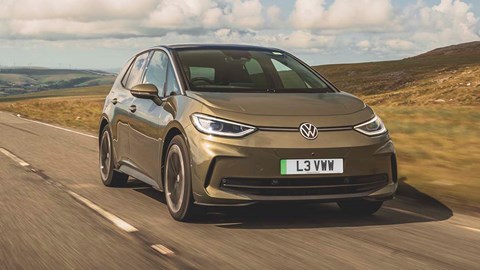
Pros: Good to drive, spacious interior, efficient
Cons: Infotainment can still be annoying, interior quality could be better
The Volkswagen ID.3 received quite a frosty reception at its launch in 2020, and in all truth, it probably wasn’t deserved. It was more the ID.3, and Golf 8 introduced at a similar time, were just quite radical changes for VW, and its customers (and aren’t known) for being radical. The ID.3’s early infotainment wasn’t great, but software updates since have improved things, and the ID.3 is otherwise excellent to drive and a great deal more spacious than a similarly-sized Golf.
Standard kit is generous across the board, and the ID.3 even offers a superb range of up to 347 miles from the largest 77kWh battery, though most you’ll see for sale pack the 58kWh unit that delivers a more than usable 250 miles from a full charge. While a new ID.3 will set you back more than £35,000, you can now pick up a high-mileage example for as little as £10,000, or lower-mileage cars for £14,000. That’s less than what an equivalent Golf of the same age would cost you.
Verdict: Which used electric car is best?
Which electric car is best will ultimately come down to what your budget is and what you’re using it for. We’ve assessed just about every EV on its merits and usability; here you can read more about how we test cars. at For a cheap city runabout where range doesn’t matter, the bargain Renault Zoe would be our top pick. If you’ve got a little more money for a used urban EV, the Fiat 500e gets our vote.
If a well-rounded family car is the order of the day, the MG5 would be our choice owing to its spacious interior and low price, while the Tesla Model 3 is another fine example at a higher price. It’s hard to beat a Tesla for range and seamless charging experience, too.
If you want a more interesting EV, the BMW i3 is the best from an aesthetic point of view, while if you’re wanting to go electric with something you can enjoy driving, it’s hard to beat the Porsche Taycan for the money.
Is it worth buying a used electric car now?
Price is perhaps the top reason for choosing a used EV, with steep depreciation on virtually every electric car meaning used values are a fraction of the initial cost. Data from Cap HPI shows that a three-year-old EV is now 8.5 per cent cheaper than a petrol or diesel equivalent, and when the car reaches four years old, that gap widens further to 14 per cent.
If you charge at home rather than on a public charger, the running costs are usually lower than those of a comparable combustion car. If you’re buying through a business or with salary sacrifice, they’re also better value as a benefit-in-kind.
What’s an EV really like to live with? We poll real-world electric car owners
Owning an electric car is the new premium. Even opting for an EV from a mainstream brand signals affluence, environmental responsibility and awareness. The reality is that the best electric cars provide a perfectly sensible means of transport for most drivers and their families once new habits are learned. They also remain highly appealing for company car users, used or new.
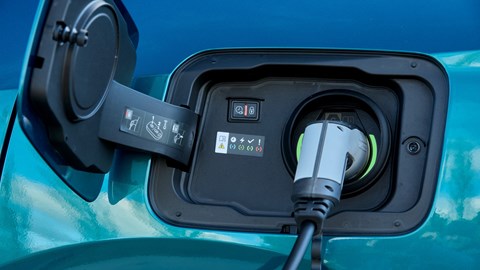
New electric cars can still be prohibitively expensive, both in cash and finance terms, with long waiting lists and delivery times for some models. An approved-used electric car from a manufacturer such as Tesla or via Spoticar, one of the Stellantis brands, is available right away at lower cost.
Before going electric, though it’s worth considering a few things. Do you have off-street parking? Do you have easy access to charging? Are most of your trips less than 80 miles? If the answer to any of these questions is no, you might find a plug-in hybrid offers a better compromise.
How old can a usable secondhand electric car be?
Electric cars have improved significantly since the Mk1 Nissan Leaf was introduced in 2010. Early EVs would service most drivers well for pottering around London, but they’ll fall over the second you ask them to stray out of the city. Their batteries will probably struggle to hold enough charge.
Technology improved significantly around 2013, and we’d consider this to be the earliest year to look for a used electric car unless you want to stay local. New EV sales really began to pick up after 2019, when the diversity of models – not least the introduction of the Tesla Model 3 – coincided with targeted incentives, particularly around company car taxation.
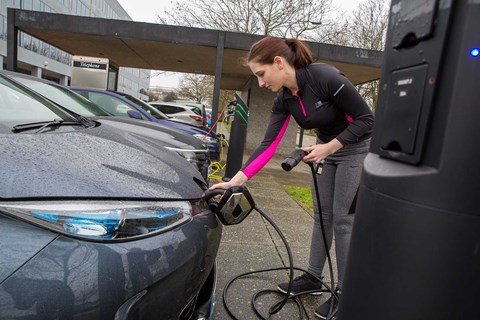
How many years does an electric car last?
The longevity of electric cars is a question that is still on many people’s minds when buying a used EV, and ultimately, just as on petrol and diesel cars, there’s no definitive date for how long an electric car lasts. Similarly, how long an EV lasts will be partly down to how it’s looked after.
However, there are plenty of early examples of EVs from more than a decade ago that are still on the road, such as the Nissan Leaf and Renault Zoe, and that’s when they were fitted with small battery packs.
An electric car’s battery is affected by how often it’s rapid charged (as opposed to slow charged at home). Unfortunately, there’s no way of measuring this. When many electric cars are serviced at a main dealer, there will be a report done to show the state of charge. Ask to see this if it’s available and also make sure to see the EV when it’s fully charged to give you an idea of the miles achievable from a full charge and the remaining state of charge.
What is considered a high mileage for an electric car?
Again, there’s no definitive number that we can give for this, it’s really down to how the car has been maintained and how often it’s been rapid charged.
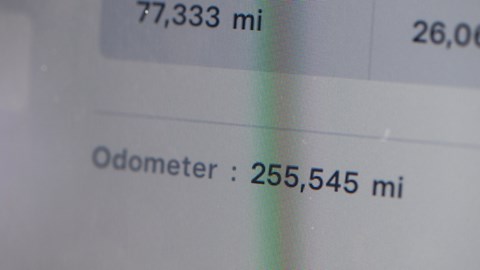
There are plenty of examples of high-mileage cars that have clocked up a lot more miles than a typical petrol or diesel car will clock up in its lifetime. At CAR, we’ve recently had a 2015 Tesla Model S in to test that had clocked up a remarkable 255,000 miles, and still with its original battery. That demonstrates that EVs are more than capable of doing high mileages.
Best used electric cars 2025: the buying guide
Despite the new technology, buying a secondhand EV buying is much like taking on any used car. In fact, some aspects are much better. For example, brake wear is reduced thanks to regenerative technology (many Nissan Leafs were still on their original discs and pads after 60,000 miles), there’s less dirt and pollution from oil and combustion and simple single-speed transmissions.
Many electric cars fail their first MOTs on simple consumables, however, which suggests owners aren’t paying as much attention as they should. Look for worn tyres, neglected wipers and faulty headlights.
The downside of EV ownership is that if things go wrong, main dealer repairs can still be very expensive and time-consuming. If a deal looks too good to be true, it could be a much bigger gamble than you anticipated…
You can read above about the best used EVs, outlining how much you should expect to pay for each and why they’re worth considering as your next car. Prices listed are using second-hand car valuation data from our sister brand, Parkers.co.uk.
How we test
Every car we’ve ever got our hands on has been through an intensive testing process, and the best used electric cars are no different. Every aspect has been researched and examined in person, from space to performance, range and much more.
It’s something we do for every car that appears in our numerous buying guides, and it’s something we do more than once – especially in the case of the best used electric cars above.
To find out more about how we put our cars through their paces, be sure to head over to our dedicated how we test cars page.